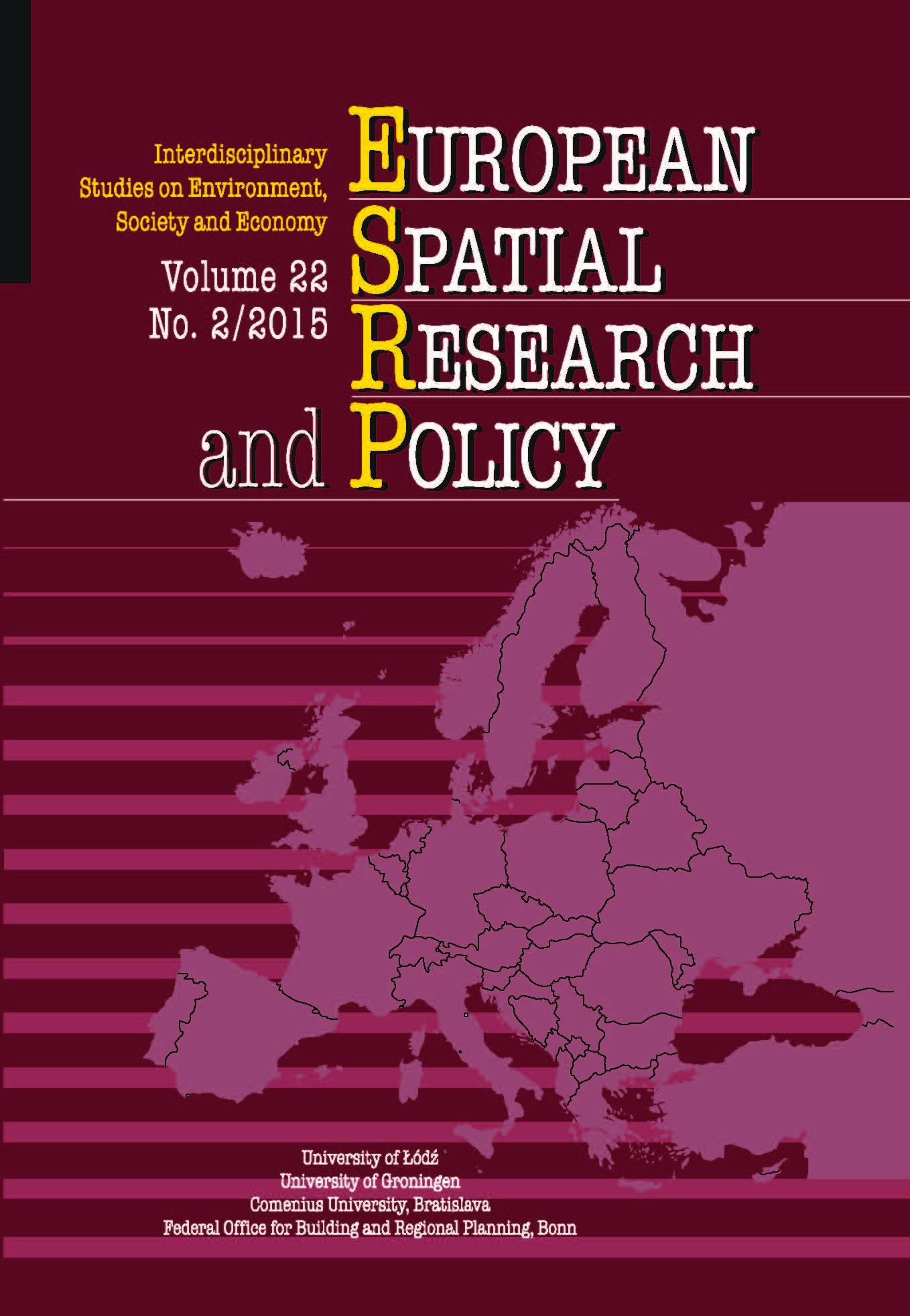A Discursive Narrative on Planning for Urban Heritage Conservation in Contemporary World Heritage Cities in Portugal
DOI:
https://doi.org/10.1515/esrp-2015-0024Keywords:
urban conservation, public realm, placemaking, heritage managementAbstract
This article analyses the structure of heritage conservation in the national context of Portugal. It assesses the political context in which planning operates, and the place of conservation and heritage planning within the planning system. By exploring how heritage conservation discourses developed within the national planning framework it is possible to understand the emergence of conservation practices and to consider recommendations for improved efficiency. The World Heritage cities in Portugal inform this research, as its designation should stand for best historic practices, internationally recognized and thus also compliant to an internationally coherent approach towards conservation policies. The narrative unveils a regulatory legislative framework exposed in general considerations rhetorically formulated as policy, usually setting out objectives and requirements, but saying ‘very little about the methodologies to be followed in the preparation of the plans’ (Rosa Pires 2001, p. 185). The resulting overlapping and sometimes conflicting competences, aims and objectives, all at play in the management of the historic city, thus call for concerted strategies underpinned by appropriate organizational and institutional structures and consistent policy making, where inclusive participation of all key stakeholders involved is critical.
Downloads
References
ALHO, C. and CABRITA, A. (1988), ‘Cartas e convenções internacionais sobre o património arquitectónico europeu’, Sociedade e Território, 6 (2), pp. 131–135.
Google Scholar
BALSAS, C. (2007), ‘City centre revitalization in Portugal: a study of Lisbon and Porto’, Journal of Urban Design, 12 (2), pp. 231–259.
Google Scholar
CARTER, N. and NUNES DA SILVA, F. (2001), ‘Recent Changes in Territorial Planning and the System for Controlling Urban Development in Portugal’, The Town Planning Review, 72 (3), pp. 341–370.
Google Scholar
CIDRE, E. (2010), Planning for public realm conservation: the case of Portugal’s World Heritage cities. Phd Thesis. UCL.
Google Scholar
CML (2005), ‘Reabilitação Urbana, Baixa Pombalina: bases para uma intervenção de salvaguarda’, Lisbon: Câmara Municipal de Lisboa – Pelouros do Licenciamento Urbanístico, Reabilitação Urbana, Planeamento Urbano, Planeamento Estratégico e Espaços Verdes.
Google Scholar
CMP (ed.) (1998), ‘Relatório final: projecto piloto urbano da Sé-Porto’, Porto: CMP.
Google Scholar
COSTA LOBO, M. (2001), Administração Urbanistica, Evolução Legal e sua Prática, IST Press.
Google Scholar
CRUARB (ed.) (2000), CRUARB 25 anos de Reabilitação Urbana, Porto: CMP.
Google Scholar
EVANS, D. (1994), ‘World Heritage Sites: Beauty Contest or Planning Constraint’, Journal of Planning and Environmental Law, June, pp. 503–508.
Google Scholar
FERNANDES, M., FIGUEIRINHAS, L., BELBETÕES/PEDRAMALBA, DE CARVALHO, J. M. (2000), ‘Intervenções da Direcção-Geral dos Edificios e Monumentos Nacionais’, [DGEMN], Monumentos 13, September, pp. 108–109.
Google Scholar
GUIMARÃES, F. (2000), ‘Uma história do CRUARB’, [in:] CRUARB (ed.), CRUARB 25 anos de Reabilitação Urbana, Porto: CMP.
Google Scholar
GONÇALVES, F. (1989), Evolução Histórica do Direito do Urbanismo em Portugal: 1871−1988. Lisbon: LNEC.
Google Scholar
ICOMOS (1987), ‘Charter on the Conservation of Historic Towns and Urban Areas’, http://www.international.icomos.org/charters/towns_e.pdf [accessed 19.06.2015].
Google Scholar
ICOMOS (2011), ‘The Valletta Principles for the Safeguarding and Management of Historic Cities, Towns and Urban Areas’, http://civvih.icomos.org/sites/default/files/CIVVIH%20Valletta%20Principles.pdf [access 19.06.2015].
Google Scholar
IPPAR (ed.) (2001), ‘Património, balanço e perspectivas [2000−2006]’, Lisbon: Ministry of Culture.
Google Scholar
JOKILEHTO, J. (1996), ‘International standards, principles and charters of conservation’, [in:] MARKS, S. (ed.), Concerning Buildings, Studies in honour of Sir Bernard Feilden, Oxford: Butterworth−Heinemann, pp. 55–81.
Google Scholar
NETO, M. (2002), ‘Carta de Cracóvia 2000: os princípios de restauro para uma nova Europa’, Estudos / Património, 3 (2), pp. 93–99. IPPAR.
Google Scholar
PINHO, P., SOUSA, S., GONZÁLEZ, R., SOLLA, X. (2005), ‘Modelos de Gestão: soluções institucionais para as cidades históricas’, Câmara Municipal do Porto and Ayuntamiento de Santiago de Compostela.
Google Scholar
ROSA PIRES, A. (2001), ‘Breaking the ties with the Master Plan: spatial strategic plans in Portugal’, [in:] ALBRECHTS, L., ALDEN, J. and ROSA PIRES, A. (eds.), The Changing Institutional Landscape of Planning, Ashgate, pp. 181–208.
Google Scholar
SRU (2008), ‘Revitalização Urbana e Social da Baixa do Porto’, Porto Vivo.
Google Scholar
STEWART, M. (2002), ‘Compliance and Collaboration in Urban Governance’, [in:] CARS, G., HEALEY, P., MADANIPOUR, A., DE MAGALHAES, C. (eds.), Urban Governance, institutional capacity and social milieu, Ashgate, pp. 149–168.
Google Scholar
Downloads
Published
How to Cite
Issue
Section
License

This work is licensed under a Creative Commons Attribution-NonCommercial-NoDerivatives 4.0 International License.














